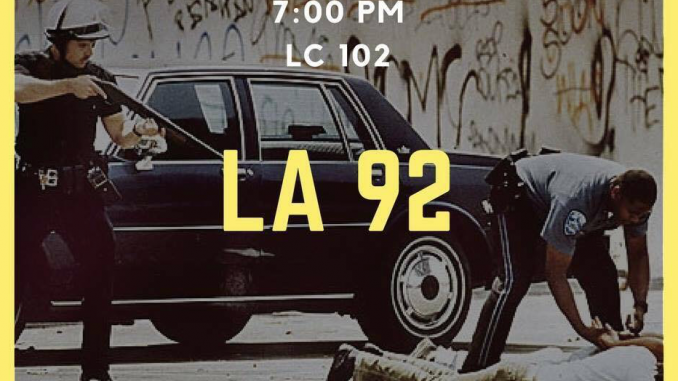
React to Film helped open eyes in the Lecture Center by hosting a screening of the National Geographic film “LA 92” in honor of the 25th anniversary of the Los Angeles riots.
The film, shown to the campus community on Thursday, April 27, centers around the beating of Rodney King by Los Angeles police officers and the riots that followed soon thereafter. The community riots, fueled by rage and disappointment, occured in the wake of the acquittal of these officers in 1992.
“This film did a great job of including a large amount of details,” said third-year digital media production major and president of React to Film Lauren Alberti. “We saw everything from the moment the footage of Rodney King was captured, the court case and when the riots finally subsided. The film was a great starting point to a very important conversation.”
React to Film aims to expose audiences in an educational setting to critical social issues using documentary films. The React to Film network extends beyond SUNY New Paltz, and is a platform of educational programs throughout high schools and colleges.
With this film, the SUNY New Paltz chapter aimed to explore racial tensions in America along with police brutality.
“National Geographic actually reached out to us about this new film,” Alberti said. “They gave us this opportunity as part of their pre-premier program. For their new films they offer college campuses the opportunity to screen the documentary to spread awareness about the topic and the film.”
After the screening, lecturer of sociology Carolyn Corrado led a discussion for students’ reactions. The discussion of the event revolved around the idea that “The Past is Prologue,” which was the slogan of the film.
“I thought the screening went well and I was glad that so many students stayed afterwards for the discussion,” Corrado said. “As a professor that values teaching and learning, it is always invigorating to discuss social issues with students and share in the process of critical thinking.”
Because most students at SUNY New Paltz today were not alive for the Los Angeles riots, React to Film felt exposure to this event was crucial for understanding race in America today.
“We chose to accept this [film] because the Los Angeles riots happened before most of us were born,” Alberti said. “We also know that what happened then is still happening now in terms of police brutality and racial tensions, so it is important to learn about what has occurred in the past and talk about why it is still happening today.”
The film covered a lot of heavy material for an audience to witness. The beating of Rodney King and the violence of the riots were all depicted vividly, and many students were unnerved by the footage.
“This film taught me that police brutality has been a lot more longstanding than I thought it was,” said first-year elementary education major Briel Freeman. “The first case I’d ever heard about was Ferguson and now I’m learning that this issue has been alive and well for long before I was born. It is really just horrible.”

